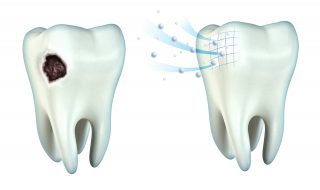
A new drug, currently used by Alzheimer’s patients, could help generate new dentine, a recent study has found.
Scientists found the drug, Tideglusib, switches off an enzyme called GSK-3, which allows dentine to start forming by stimulating stem cells within the pulp of the tooth.
Researchers believe it will be possible to soak a biodegradable sponge with the drug and insert it into a cavity to promote dentine growth.
‘The simplicity of our approach makes it ideal as a clinical dental product for the natural treatment of large cavities, by providing both pulp protection and restoring dentine,’ Professor Paul Sharpe, lead author of the study, from King’s College London, said.
‘In addition, using a drug that has already been tested in clinical trials for Alzheimer’s disease provides a real opportunity to get this dental treatment quickly into clinics.’
End of fillings
This new technique could make fillings to treat large cavities in teeth a thing of the past.
The drug, which has only been tested on mouse teeth so far but was shown to ‘fill the whole injury site’, would help to regenerate minerals in large cavities and fill holes negating the need for fillings.
‘This is an extremely interesting and novel approach, which shows great promise and we will look forward to it being translated into clinical application that could undoubtedly be a progressive step in the treatment of dental disease,’ Dr Nigel Carter, CEO of the Oral Health Foundation, said.
‘While fillings have remained highly effective in repairing large cavities, they are susceptible to wear-and-tear and can occasionally be in need of repair and replacement.
‘This presents problems as the dentist could have to remove and fill a larger area each time and after numerous treatments the tooth may then have to be extracted.
‘Creating a more natural way for the tooth to repair itself could not only eliminate these issues, but also be a far less invasive treatment option for patients.
‘With dental phobia still being very common, using a natural way to stimulate the renewal of dentine could be an especially comforting proposal for these groups, for which undergoing treatment can often be a cause great anxiety.’


